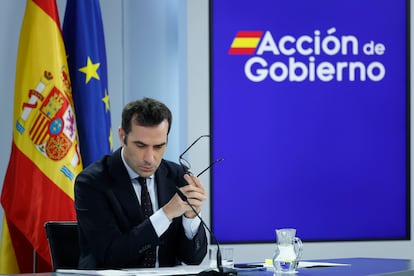The consultation on BBVA's takeover bid for Sabadell: neither arbitrary nor illegal

Text in which the author advocates ideas and draws conclusions based on his or her interpretation of facts and data

European competition law is strengthened in cases such as BBVA's takeover bid for Sabadell . It is a lever for federalization. The Costa/ENEL ruling by the Court of Justice of the European Union (CJEU) in 1964 enshrined the transcendental principle of the primacy of common law over national law. Without it, the Union would be fragmented, due to a lack of common rules.
The growing and expansive pace of this right counteracts the exponential rise in market obstacles. Abusive practices, price fixing, abuses of dominant positions, and anti-competitive mergers are proliferating. It is an endogenous tendency of capitalism to sterilize competitors. Without these rules that sanitize it, the plurality of companies ends in oligopolies or monopolies . Just as democracy turns into dictatorship if it descends into a single party.
Since at least 1993, in step with the imminent Scandinavian enlargement, this law, which had removed multiple inter-company distortions, has emphasized consumer protection, its frequent victim. Directive 93/13 on unfair terms inherits from it the concept of protection "of purchasers of goods and services" against "abuse of power" and to "stimulate competition." It expands on this concept.
Its application to the banking sector became legendary in Spain. The CJEU overruled the Supreme Court in the floor clause case. Its ruling of December 21, 2016, enhanced the rights of mortgage holders. It saved them, as consumers were in a "position of inferiority," a reverse evocation of the "dominant position."
Now another innovation is occurring in Spain, not a regulatory one, but a practical one: the Ministry of Economy's open "consultation" of those "affected" by the takeover bid . Only haste can qualify it as populist: not even municipal participatory budgets are, and unlike them, they are not binding.
Only ignorance or a lack of legal knowledge can accuse it of being arbitrary or illegal. It's the other way around : it activates—on the path of European expansion—a (rarely used) phase of a competition procedure, one that falls to the government, which has its own legal powers like the other converging bodies (CNMV, CNMC, ECB, etc.).
Or perhaps because this government doesn't like it, should they be denied ? Or because it wants to hear the voices of those affected—the CNMC has done so late and poorly, restrictively, and forced by an appeal to the National Court—should it be considered a promoter of a referendum on little more than self-determination?
The Executive's power to adopt or modify the decisions of the CNMC and, therefore, to previously question those affected about whether there are public goods or reasons of "general interest other than competition" that should be additionally protected is set forth in the 2007 Competition Law (Articles 10 and 60). That these issues can arise seems obvious.
Thus, a restriction on credit sources (such as those caused by a merger) usually leads to less business investment in R&D, an area that is quickly cut in every crisis. Or it can harm financial inclusion (social cohesion). Or it can evaporate social, cultural, and educational projects, directly or indirectly, as happened with the takeover of the savings banks (territorial cohesion). Whether this is the case or not in this case remains to be seen. Or better yet, to be heard.
EL PAÍS





